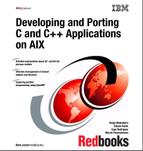Subroutines defined in the POSIX thread standard
We have categorized the Pthread subroutines defined in the POSIX thread standard, which are supported on AIX, into the following:
| Thread management sub-routines | See Table D-1. |
| Execution scheduling sub-routines | See Table D-2 on page 476. |
| Synchronization sub-routines | See Table D-3 on page 477. |
| Thread-specific data sub-routines | See Table D-4 on page 479. |
| Name | Description |
|---|---|
| pthread_key_create() | Creates a thread-specific data key. The key is shared among all threads within the process, but each thread has specific data associated with the key. The thread-specific data is a void pointer, initially set to NULL. An optional destructor routine can be specified. It will be called for each thread when it is terminated and detached, after the call to the cleanup routines, if the specific value is not NULL. |
| pthread_key_delete() | Deletes the given thread-specific data key previously created with the pthread_key_create() subroutine. The application must ensure that no thread-specific data is associated with the key. |
| pthread_setspecific() | Associates a thread-specific value with a key obtained through a previous call to pthread_key_create(). Different threads may bind different values to the same key. |
| pthread_getspecific() | Returns the value currently bound to the specified key on behalf of the calling thread. |
Note
Currently, AIX does not support the following sub-routines. Although the symbols are provided in the Pthread library, but calls to these routines always return with ENOSYS:
pthread_mutexattr_setprioceiling()
pthread_mutexattr_getprioceiling()
pthread_mutexattr_setprotocol()
pthread_mutexattr_getprotocol()
pthread_mutex_setprioceiling()
pthread_mutex_getprioceiling()
..................Content has been hidden....................
You can't read the all page of ebook, please click here login for view all page.
